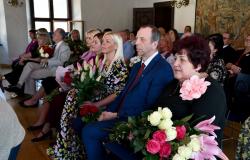A doctor’s assistant or paramedic is especially important in more remote parishes
One of the functions of the municipality is to take care of the health of the population by organizing the availability of health care services. Primary health care in our country is provided by family doctors, there are 27 of them in Cēsi county, but in places where this practice does not legally exist, there are paramedic points, a doctor’s assistant is available every day, and a family doctor is also accepted on certain days.
The names of these health care points are different, but the function is the same. In the Cēsi region, the contract with the National Health Service (NVD) has been concluded for the Veselava paramedic point, the Mārsnēni health care institution, the Taurene paramedic midwife point, the Ieriķi day care center, the Gikšu day care center, the Nītaure day care center and the Zosēni parish paramedic point. There are paramedic points that work every day, there are those that work on certain days. A day care center also operates in Drabešu parish Līvos, a paramedic point in Inešu parish, but they do not have a contract with NVD.
Availability remains unchanged
The representative of the National Health Service (NHS) Evija Štalberga explains that the service can close the contract with the municipality on the operation of the paramedic point for the provision of primary health care services if one of the following conditions applies: there is no registered family doctor’s practice in the county parish or the distance from the paramedic point to the nearest family doctor for practice is greater than 10 km; not less than 400 inhabitants declared; the service has received a confirmation from the relevant municipality or the resident family doctor that the resident family doctor will provide family doctor services in the specific territory after receiving the certificate.
NVD funds the monthly fixed payment for the provision of primary health care services, including the risk payment – 400 euros per month, as well as the payment for health care services performed by medical personnel. The physician’s assistant receives the average salary of medical and patient care persons and assistants of functional specialists, adding the rate of mandatory contributions of the state social insurance and taking into account the amount of work specified in the contract with NVD – workload, that is, 1,388 euros without social tax (1,715.43 euros with social taxes). It should be noted that most of the workers at paramedic stations do not have a full workload, usually half-time or 0.75 of the workload.
In turn, the municipality finances other expenses to ensure the operation of paramedic points. This year, 138.6 thousand euros have been allocated to this funding in the budget of the Cēsis region.
In recent years, the number of paramedic points (6) in the region has remained unchanged. The executive director of the municipality, Līga Bukovska, believes that it is currently sufficient: “We have not received any signals that such a service would be needed in any other place. But perhaps we will need another paramedic point in time.”
FOR REFERENCE
In areas where getting to a family doctor is difficult due to traffic or other conditions, residents have access to a doctor’s assistant (paramedic).
A paramedic is a medical person who ensures the provision of primary health care services – provides patient care, participates in treatment, educates patients on health issues, as well as examines patients, diagnoses the disease and provides treatment according to his qualifications.
Source: National Health Service
Very necessary for older people
Physician assistants working at paramedic stations admit that they do not lack work, residents regularly use the opportunity to receive the necessary health care.
This is especially important for elderly people who do not have their own car, because of their health it is difficult to use public transport to get to the doctor, as it is often difficult to walk for a long time. It should also be taken into account that there are remote places where public transport rarely runs, and the roads are not always easy to pass. That’s why residents appreciate that a doctor’s assistant is available near their home, as well as a family doctor available once a week at the paramedic point, who can prescribe a referral to other specialists, as well as, if necessary, apply to the State Commission for the Examination of Health and Working Capacity Doctors for the determination of disability, as well as prescribe special drug prescriptions.
Now, when spring and winter alternate, people suffer from diseases caused by seasonal viruses, often upper respiratory tract diseases. In the spring, when the neighborhood cleaning and gardening work begins, patients often develop or worsen problems with their backs, joints, or muscle pain. This year, more work should be invested in ensuring that children receive a free vaccine against tick-borne encephalitis. Cēsi county is included in the territory where children are paid for by the state, doctors call the parents of small patients and inform them about this possibility. Physician assistants also keep track of the vaccination schedule for other preventive measures.
In the district, the employees of the paramedic points have a lot of experience, they know their patients and their faults very well, and they can help promptly. If necessary, small manipulations are also performed – foreign body is removed, sutures are removed after the operation, bandaging is performed.
Physician assistants who work at paramedic stations are satisfied with the existing procedures and also the technical provision. Municipal financing provides the necessary materials and utility expenses for the work. Doctors rate bureaucracy as the most unpleasant thing at work, state requirements for filling out documentation are constantly changing, as new orders are regularly issued that must be taken into account and for the execution of which a lot of time must be spent on additional direct work duties.
A local favorite
At the Mārsnēni health care facility, patients are accepted by doctor’s assistant Pārsla Údre. Local residents use her help in health matters, stressing that the doctor is very knowledgeable and responsive, if the patient needs it, she will even call and tell them what the results of the tests are and what needs to be done. The residents of Mārsnēni consider that a specialist is irreplaceable in the parish. The doctor’s assistant accepts patients on Mondays and Fridays from eight to two. Residents admit that this is enough time to get all those who need counseling or have any acute health complications.
In a conversation with “Druva”, P. Údre says that he has been working in Mārsnēni since 2009. Before that, she also had experience at a paramedic point in Vaive parish, Rīdzene, but her main job was in emergency medical assistance for a long time, she worked in Cēsis, rarely in the Taurene brigade. Now retired, he works part-time in Mārsnēni.
Mr. Udre lives in Priekulii. It takes a lot of time to get to work, especially in winter when using public transport. Then you have to get from Priekuili to Cēsis and from there to Mārsnēni. In warmer weather, the doctor’s assistant travels in her own car, so she has to spend less time on the road, the journey is more comfortable and, if necessary, she can also go to the patient’s home. For example, recently a person with a broken pelvis needed help.
On average, 15-20 patients come to the reception, the smallest number of visitors per day was ten people. The needs are different. Parents bring their children to check their children’s health or get a sign to return to preschool after a break. Adult patients are different, help is needed in cases of both chronic and acute illnesses. Necessary medications must be prescribed, and work incapacity sheets must also be issued.
The Mārsnēni health care facility is not attached to a family doctor’s practice, so preventive vaccinations cannot be performed here. The services of a family doctor are mostly used by the people of Maršne in Liepā. Family doctor Aija Smeķe, who mostly works with children, comes to the parish from Liepa twice a month.
Parsla Údre believes that the municipality provides well what is needed for the work of a doctor’s assistant, but there is another problem. In other words, it is likely that soon there will be a shortage of these specialists. A large number of paramedics are of a respectable age, so the question is whether there will be someone to continue their work. “Most likely, when I finish my job, there won’t be a doctor here anymore. Mārsnēni is far from other settlements, young specialists are unlikely to be willing to measure this distance – both because of the salary and because fuel is expensive,” says P. Łudre and admits that she feels sorry for the people of Mārsnēni in this sense, but she knows each of them personally , knows ailments and how best to help.






